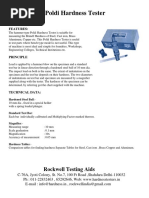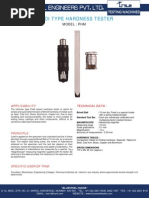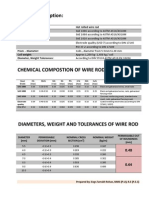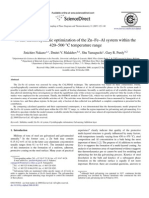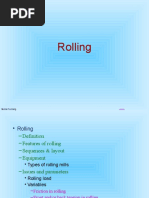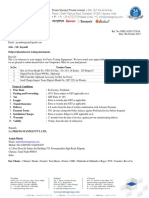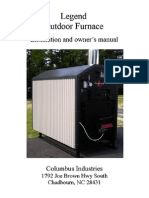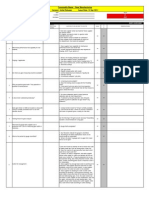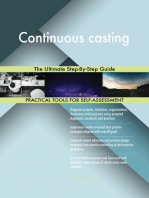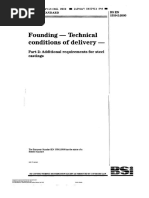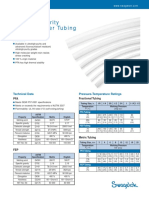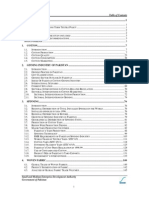Poldi Impact Hardness Tester Poldihammer
Poldi Impact Hardness Tester Poldihammer
Uploaded by
Pedro SilvaCopyright:
Available Formats
Poldi Impact Hardness Tester Poldihammer
Poldi Impact Hardness Tester Poldihammer
Uploaded by
Pedro SilvaOriginal Description:
Original Title
Copyright
Available Formats
Share this document
Did you find this document useful?
Is this content inappropriate?
Copyright:
Available Formats
Poldi Impact Hardness Tester Poldihammer
Poldi Impact Hardness Tester Poldihammer
Uploaded by
Pedro SilvaCopyright:
Available Formats
Hardness testing
Poldi Impact
Hardness Tester
This is the simplest and most economical device for detecting hardness according
to Brinell and determining tensile strength of engineering and tool steels, dies, for-
gings, railway material, beams, sheets, pipes, cast steel and various parts of steel as
well as determining hardness according to Brinell for cast bronze, aluminium, brass,
copper, grey and chilled cast iron.
Härtemessung
Poldihammer
Einfachstes und wirtschaftliches Gerät für die Ermittlung der Brinellhärte und der
Zugfestigkeit von Bau- und Werkzeugstahl, Gesenken, Matrizen, Schmiedestücken,
Eisenbahnmaterial, Trägern, Blechen, Rohren, Stahlguß und der verschiedensten
Teile aus Stahl, sowie der Brinellhärte von Bronzeguß, Aluminiumguß, Messing,
Kupfer, Grauguß und Hartguß.
GmbH • Hermann-Schlichting-Str. 14 • D-38110 Braunschweig • Telefon: +49 (0)5307 95102-0 • www.baq.de
Poldi Impact Hardness Tester
enables to perform the impact test with the help of a hammer at workplaces, in workshops, at assembly sites or any
other places. Brinell hardness and tensile strength can be seen in tables. The test made with the POLDI hardness
tester shall be performed in the following way:
Directions for use:
Quenched steel ball with the diameter of 10 mm shall be put between the piece tested and calibrated steel bar of a
defined tensile strength (check test piece). A single strong hammer stroke shall create ball impressions into the check
test piece and the piece tested at the same time. Diameters of both impresions have to be measured carefully with a
magnifier provided with the tester. Based on the values measured, Brinell hardness and tensile strength of the piece
tested can be found in the table. If a measuring microscope is available, diameters of impressions can be taken more
precisely.
When the common POLDI hardness tester uses the check test piece made of steel having the strength of 70
kg/mm2 , the deviation of the tensile strength converted from the Brinell hardness compared to the real tensile
strength in case of steel having the strength of 50-100 kg/mm2 is maximum ± 3 %, in case of milder types of
iron and steel and steel having the strength of 100-150 kg/mm2 (e.g. with hardened, heat treated and high alloyed
steels) it is maximum ± 5 %. With the stength of 150 – 200 kg/mm2 , inaccuracy may be, under certain conditions,
even a little higher.
POLDI hardness tester, as well as Brinell hardness tester, may be used for all forgeable iron and steel types with
the exception of austenitic steels, e.g. steel with 25 % Ni, steel with 14 % Mn, corrosion- resistant Cr-Ni steel, non-
magnetic steel, etc.
Each calibrated steel piece can be used for about 40 tests.
Der Poldi Härteprüfer
gestattet die Prüfung durch Schlagwirkung mit einem Hammer am Arbeitsplatz, in der Werkstätte, bei Monta-
gen und anderen Orten. Die Brinellhärte und die Zugfestigkeit können direkt aus Tabellen entnommen werden.
Die Prüfung mit dem POLDI Härteprüfer wird wie folgt vorgenommen:
Verwendung:
Eine gehärtete Stahlkugel von 10 mm Durchmesser wird zwischen den zu prüfenden Gegenstand und einen ge-
eichten Stahlstab von bestimmter Zugfestigkeit (Vergleichsstab) gebracht. Durch einen einzigen, kräftigen Schlag
mit einem Hammer wird ein Kugeleindruck gleichzeitig im Vergleichsstab und auf dem zu prüfenden Stück erzeugt.
Die Durchmesser der beiden Eindrücke werden sorgfältig mit einer dem Gerät beigelegten Meßlupe gemessen. Die
Brinellhärte und die Festigkeit des zu untersuchenden Stücks können aufgrund dieser Werte direkt aus der Zahlen-
tabelle bestimmt werden. Ist ein Meßmikroskop vorhanden, kann die Eindruckdurchmesser viel genauer gemessen
werden.
In der üblichen Ausführung des POLDI Härteprüfers mit einem Vergleichsstab aus Stahl mit einer Festigkeit von 70
kg/mm2 ist die größte Abweichung der Kugeldruckfestigkeit von der wirklichen Zugfestigkeit bei Stahl von 50 – 100
kg/mm2 Festigkeit ± 3 %, bei weicheren Eisen- und Stahlsorten und bei Stahl von 100 – 150 kg/mm2 Festigkeit
(z.B. bei gehärteten, vergüteten und hochlegierten Stählen) ± 5 %. Bei einer Festigkeit von 150 – 200 kg/mm2 kann
unter Umständen die Ungenauigkeit etwas größer sein.
Der POLDI Härteprüfer ist ebenso wie die Brinell’sche Kugeldruckpresse für alle schmiedbaren Eisen- und Stahl-
sorten anwendbar, mit Ausnahme der austenitischen Stähle, wie 25% Nickelstahl, 14 % Manganstahl, rostsicherem
Chrom-Nickelstahl, unmagentischem Stahl usw.
Einzelne geeichte Stahlstücke sind für etwa 40 Versuche ausreichend.
GmbH
Hermann-Schlichting-Straße 14
D-38110 Braunschweig
Telefon: +49 (0)5307 95102-0
www.baq.de
poldi_de_en_0-1_17-5
You might also like
- Measuring Flatness Characteristics of Steel Sheet Products: Standard Practice ForDocument9 pagesMeasuring Flatness Characteristics of Steel Sheet Products: Standard Practice Forguillermo aponte100% (1)
- PROCEQ Equotip-550 PDFDocument14 pagesPROCEQ Equotip-550 PDFSiti NurhikmahNo ratings yet
- Exam 1 SolutionDocument10 pagesExam 1 SolutionLucas GalingNo ratings yet
- Poldi Hardness TesterDocument1 pagePoldi Hardness TesterImtiyaz AliNo ratings yet
- Astm A217 A217m 2010 PDFDocument4 pagesAstm A217 A217m 2010 PDFPedro SilvaNo ratings yet
- Haulotte Compact 8-10-12 Elec Scissor ManualDocument76 pagesHaulotte Compact 8-10-12 Elec Scissor Manualezeizabarrena96% (28)
- Haulotte Compact 8-10-12 Elec Scissor ManualDocument76 pagesHaulotte Compact 8-10-12 Elec Scissor Manualezeizabarrena96% (28)
- Ms 522 Part 12003 Portland Cement (Ordinary and Rapid-Hardening) Part 1 Specification (Second Revision) - 709539Document26 pagesMs 522 Part 12003 Portland Cement (Ordinary and Rapid-Hardening) Part 1 Specification (Second Revision) - 709539Deraman Abdullah100% (5)
- Poldi Type Hardness Tester: Model: PHMDocument1 pagePoldi Type Hardness Tester: Model: PHMshifaNo ratings yet
- Lab Asst AdmitDocument2 pagesLab Asst AdmitTathagata DasNo ratings yet
- TQM For Steel Bars PDFDocument36 pagesTQM For Steel Bars PDFImtiazuddin AhmedNo ratings yet
- Product Description Wire RodDocument3 pagesProduct Description Wire RodEngr Farrukh RehanNo ratings yet
- MBH Catalogue 2019Document56 pagesMBH Catalogue 2019Anonymous 1oWzM3No ratings yet
- Whale KeypointsDocument16 pagesWhale KeypointsAmos FiestaNo ratings yet
- ISO 1035-2 1980 Ed.1 - Id.5508 Publication PDF (Image Based PDF 600dpi) ...Document4 pagesISO 1035-2 1980 Ed.1 - Id.5508 Publication PDF (Image Based PDF 600dpi) ...Carolina LeonNo ratings yet
- Is0 6935-2-1991 (E)Document6 pagesIs0 6935-2-1991 (E)Roger Niu0% (1)
- TMT Bars (Friends ISI) PDFDocument3 pagesTMT Bars (Friends ISI) PDFPiyushiNo ratings yet
- Is 513 Amendment-1Document2 pagesIs 513 Amendment-1sanjeev00747488No ratings yet
- Astm A572m PDFDocument4 pagesAstm A572m PDFrianaseptianiNo ratings yet
- Automotive Gray Iron Castings: Standard Specification ForDocument5 pagesAutomotive Gray Iron Castings: Standard Specification Foralucard375No ratings yet
- Packaging, Marking, and Loading Methods For Steel Products For Domestic ShipmentDocument41 pagesPackaging, Marking, and Loading Methods For Steel Products For Domestic Shipmentamer100% (1)
- Tensile Strength/yield Strength (TS/YS) Ratios of High-Strength Steel (HSS) Reinforcing BarsDocument9 pagesTensile Strength/yield Strength (TS/YS) Ratios of High-Strength Steel (HSS) Reinforcing BarsEugine BalomagaNo ratings yet
- Urban Bus SpecificationsDocument210 pagesUrban Bus Specificationsabdul quadirNo ratings yet
- The Taguchi Method:: The Service Manager S Primer To Quality by Ruth Robertson, Boise State University ©2002Document26 pagesThe Taguchi Method:: The Service Manager S Primer To Quality by Ruth Robertson, Boise State University ©2002Prateek Khanna100% (2)
- Product Presentation PDFDocument56 pagesProduct Presentation PDFmangalraj900No ratings yet
- Iso 657 14 2000 en FR PDFDocument11 pagesIso 657 14 2000 en FR PDFVivekanandh00333 VivekNo ratings yet
- Steel Grades and QualitiesDocument16 pagesSteel Grades and QualitiesArnold TunduliNo ratings yet
- Zn-Fe-Al Phase Diagram Low TempDocument16 pagesZn-Fe-Al Phase Diagram Low Tempbdavis33100% (1)
- Maruti Car ManufactureDocument37 pagesMaruti Car ManufactureVema AbhiramNo ratings yet
- Amendment No. 6 June 2021 To Is 1239 (Part 1) : 2004 Steel Tubes, Tubulars and Other Wrought Steel Fittings - SpecificationDocument3 pagesAmendment No. 6 June 2021 To Is 1239 (Part 1) : 2004 Steel Tubes, Tubulars and Other Wrought Steel Fittings - SpecificationRaghav Tiwary0% (1)
- Defects in SteelDocument16 pagesDefects in SteelAasim AzmiNo ratings yet
- Rolling MM3041Document17 pagesRolling MM3041HistorianNo ratings yet
- Ancon CXL Coupler Brochure International Version 2015Document10 pagesAncon CXL Coupler Brochure International Version 2015AhmedMahmoudNo ratings yet
- Indian Standard Testing Is 13015 - 1991Document11 pagesIndian Standard Testing Is 13015 - 1991joseNo ratings yet
- Aisi 4340Document3 pagesAisi 4340santoshNo ratings yet
- Presto Impact TestingDocument4 pagesPresto Impact TestingAnonymous 5AmJ13mLkNo ratings yet
- 03 Specification PDFDocument8 pages03 Specification PDFSihamaSihamNo ratings yet
- Indian Standard For Drinking Water As Per Bis Specifications Is 10500 - 2012 - A Presentation by ArghyamDocument30 pagesIndian Standard For Drinking Water As Per Bis Specifications Is 10500 - 2012 - A Presentation by ArghyamGireesh Gowda Giri100% (1)
- SWOT Analysis of BSRMDocument2 pagesSWOT Analysis of BSRMHaider RahiNo ratings yet
- Carbon Steels: Hot-Rolled Steel StripDocument7 pagesCarbon Steels: Hot-Rolled Steel Stripwulfgang66No ratings yet
- Calculations For Hot Stretch Reducing ProcessDocument8 pagesCalculations For Hot Stretch Reducing ProcessKANo ratings yet
- Sti 2062Document7 pagesSti 2062fyzmfaNo ratings yet
- Statistical Quality ControlDocument23 pagesStatistical Quality ControlGummanur SreenathNo ratings yet
- Supraform S315-700 MC / EN10149-2 S315-700 MC: Hot Rolled High Strength Low Alloy Structural Steel CoilDocument2 pagesSupraform S315-700 MC / EN10149-2 S315-700 MC: Hot Rolled High Strength Low Alloy Structural Steel CoilHugo RodriguezNo ratings yet
- ASM Material Data SheetDocument2 pagesASM Material Data SheetShankar PranavNo ratings yet
- IS Code 1731-1971Document2 pagesIS Code 1731-1971kaustavNo ratings yet
- Poster VVVVDocument1 pagePoster VVVVManishi GoelNo ratings yet
- ASAADocument4 pagesASAASanjay MehtaNo ratings yet
- Dts Presentation (Sliding Bearing Materials)Document11 pagesDts Presentation (Sliding Bearing Materials)Vaibhav KirtiwarNo ratings yet
- Legend Outdoor Wood Furnace ManualDocument16 pagesLegend Outdoor Wood Furnace ManualJeff McCarthy100% (1)
- Extrusion Fig Q A AnalysisDocument13 pagesExtrusion Fig Q A AnalysisRavinder AntilNo ratings yet
- Apex SteelDocument64 pagesApex SteelSteve Jsob100% (1)
- Spring Dowel PinDocument16 pagesSpring Dowel Pinramesh gondilNo ratings yet
- Tension Test of Deformed Reinforcing Steel BarDocument2 pagesTension Test of Deformed Reinforcing Steel BarRomulo Cubid100% (1)
- Astm b117 Testing v1Document3 pagesAstm b117 Testing v1maddumaNo ratings yet
- Tips For Auditing Your Green Sand SystemDocument10 pagesTips For Auditing Your Green Sand Systemcrazy dNo ratings yet
- Is 4270Document6 pagesIs 4270Punam RabhaNo ratings yet
- GM 1927-16a PWT Gear Commodity AuditDocument5 pagesGM 1927-16a PWT Gear Commodity AuditSergio BoillosNo ratings yet
- Steel Reinforcement Bar A Tensile Testing GuideDocument4 pagesSteel Reinforcement Bar A Tensile Testing GuideAnonymous ggwJDMh8No ratings yet
- Steel Chemical AnalysisDocument4 pagesSteel Chemical AnalysisAries Falag-eyNo ratings yet
- Analysis On The Cause of Longitudinal Crack On The Hot-Rolled Ribbed Bar SurfaceDocument5 pagesAnalysis On The Cause of Longitudinal Crack On The Hot-Rolled Ribbed Bar SurfaceTanjidul IslamNo ratings yet
- Material Grades enDocument30 pagesMaterial Grades enEmmanuel Lugo BeltranNo ratings yet
- Fasteners, Bolts, B8M, B7 Manufacturer & Exporter, Al Metals Supplier Repute SteelDocument4 pagesFasteners, Bolts, B8M, B7 Manufacturer & Exporter, Al Metals Supplier Repute SteelPRAVINNo ratings yet
- ZXDocument6 pagesZXPedro SilvaNo ratings yet
- 13 PDFDocument14 pages13 PDFPedro SilvaNo ratings yet
- Phoenix 7018 Phoenix 6013Document1 pagePhoenix 7018 Phoenix 6013Pedro SilvaNo ratings yet
- Astm A479Document8 pagesAstm A479Orlando Rojas100% (3)
- A488Document18 pagesA488Pedro SilvaNo ratings yet
- BS en 1559-2 - 2000Document26 pagesBS en 1559-2 - 2000Pedro SilvaNo ratings yet
- EurotrodDocument76 pagesEurotrodPedro SilvaNo ratings yet
- En 60974-4 2007 - Arc Welding EquipmentDocument18 pagesEn 60974-4 2007 - Arc Welding EquipmentPedro SilvaNo ratings yet
- BS en 12516-2 2004 Industrial Valves - Calculation Method F Steel ValveDocument92 pagesBS en 12516-2 2004 Industrial Valves - Calculation Method F Steel Valvethiagorep17No ratings yet
- User Manual Redpoint - PirometroDocument13 pagesUser Manual Redpoint - PirometroPedro SilvaNo ratings yet
- Electrical Installations For Impressed Current Cathodic Protection SystemsDocument30 pagesElectrical Installations For Impressed Current Cathodic Protection Systemshitm357No ratings yet
- Glass Cutting Guide - Techniques and Tools For Quality ResultsDocument35 pagesGlass Cutting Guide - Techniques and Tools For Quality ResultsJasmin DesmaraisNo ratings yet
- Technoarchitecture - Inc: Ground Floor ExcavationDocument26 pagesTechnoarchitecture - Inc: Ground Floor ExcavationAnil PuvadaNo ratings yet
- Stir CastingDocument54 pagesStir Castingmr23mem2s01No ratings yet
- Jotatem 250Document5 pagesJotatem 250Quach AnNo ratings yet
- Material Safety Data Sheet For Nickel Cadium BatteryDocument3 pagesMaterial Safety Data Sheet For Nickel Cadium BatteryM Usman ChaudharyNo ratings yet
- Cip 42 Fissuras TérmicasDocument2 pagesCip 42 Fissuras Térmicasandré felipe da silvaNo ratings yet
- HL Citizen Charter WSC KannurDocument12 pagesHL Citizen Charter WSC KannurArunkumar SNo ratings yet
- Fluoropolymer Tubing (MS 02 196)Document2 pagesFluoropolymer Tubing (MS 02 196)herysyam1980No ratings yet
- Whitmore BMG-6000 Open Gear LubricantDocument1 pageWhitmore BMG-6000 Open Gear LubricantDon HowardNo ratings yet
- High Performance Polymers for Oil and Gas 2013 1st Edition Smithers Rapra 2024 scribd downloadDocument71 pagesHigh Performance Polymers for Oil and Gas 2013 1st Edition Smithers Rapra 2024 scribd downloadsarodevetka100% (2)
- Nas 64 (Uns s32506) - Improved 329j1Document4 pagesNas 64 (Uns s32506) - Improved 329j1Afronie Cepoz D'nextNo ratings yet
- Plain and Laminated Elastomeric Bridge Bearings: Standard Specification ForDocument4 pagesPlain and Laminated Elastomeric Bridge Bearings: Standard Specification ForFRANZ RICHARD SARDINAS MALLCONo ratings yet
- Textile Vision - Fayyaz Industry Support CellDocument596 pagesTextile Vision - Fayyaz Industry Support CellTaimur Shan100% (1)
- Recommended Audit Testing Frequency For Pavement and Concrete Material 22 August 2011.RCN-D14 23245716Document21 pagesRecommended Audit Testing Frequency For Pavement and Concrete Material 22 August 2011.RCN-D14 23245716Babu NaikNo ratings yet
- NHXCH-FE 180/E 90: Security Cable, Halogen-Free, 0,6/1kV, With Improved Fire CharacteristicsDocument2 pagesNHXCH-FE 180/E 90: Security Cable, Halogen-Free, 0,6/1kV, With Improved Fire CharacteristicsbebeNo ratings yet
- Catalogue-Thtfa-3 - en Foam AgentDocument2 pagesCatalogue-Thtfa-3 - en Foam AgentYahya SalemNo ratings yet
- Work Method Statement: BNPP-HSE-JHA-2014-210 6Document8 pagesWork Method Statement: BNPP-HSE-JHA-2014-210 6Karthik babuNo ratings yet
- Experimental Properties Evaluation of Fiber Reinforced Concrete Related To Canal-LiningDocument2 pagesExperimental Properties Evaluation of Fiber Reinforced Concrete Related To Canal-LiningWaqas AnjumNo ratings yet
- Solbin A Tds 3.2014rsDocument2 pagesSolbin A Tds 3.2014rsGarvit GuptaNo ratings yet
- Chapter: Bill of Quantities: 1 Provisional SumDocument12 pagesChapter: Bill of Quantities: 1 Provisional SumRam Prasad AwasthiNo ratings yet
- Soap and DtergenetsDocument13 pagesSoap and DtergenetsAkanksha PanigrahyNo ratings yet
- Review of Naphthenic Acid Corrosion in Oil RefiningDocument7 pagesReview of Naphthenic Acid Corrosion in Oil RefiningNoorain AhmadNo ratings yet
- Miginox 347 / Tiginox 347: Classification: ApprovalsDocument1 pageMiginox 347 / Tiginox 347: Classification: ApprovalsJagannath SahuNo ratings yet
- Lirik Air Pasang DalamDocument14 pagesLirik Air Pasang DalamNur AtirahNo ratings yet
- CarpentryDocument2 pagesCarpentryMarion LauritoNo ratings yet
- BS en 10028 2 2017 PDFDocument34 pagesBS en 10028 2 2017 PDFQuang Vu100% (3)
- Substructure (All Provisional)Document12 pagesSubstructure (All Provisional)Andrew MwambaNo ratings yet
- Activity 3 - Oceña, Margarito Jr. o - Forensic Chemistry Laboratory - BS Crim - 3deltaDocument4 pagesActivity 3 - Oceña, Margarito Jr. o - Forensic Chemistry Laboratory - BS Crim - 3deltaMARGARITO JR. OCEÑANo ratings yet



